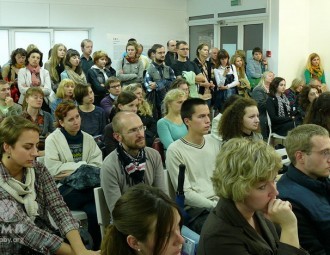Tatsiana Vadalazhskaja: This year historical courses in the “Flying University” are prevailing
 photo amp.by
photo amp.by
What attractions did the program of the Flying University for 2014-2015 prepare for its audience? And what audience are lectors hoping to see?
On September 9 new academic year is to start at the Flying University. How is the new program different from the former ones, and how is it going to attract the audience?
EuroBelarus Information Service discussed it with Tatsiana Vadalazhskaja, a candidate of sociological sciences, a coordinator at the Flying University.
- What interesting and remarkable is the program for the 2014-2015 academic year to introduce?
- On the one hand, our program remains as it is: courses, seminars, discussions, and communications within the conference.
As to something new, now we are discussing how we should and can move further across the Flying University’s platform, as well as trying to communicate more with seminars: Biblical translation workshop with Iryna Dubianetskaja, seminar “Introduction to systems approach” with Uladzimir Matskevich, seminar on social analytics with Pavel Barkouski, and the continuation of one more seminar on methodology.
And these groups will be working more closely with intellectual product. Of course, we also invite experts, and those who once graduated from the Flying University and want to cooperate.
What else remarkable do we have? Somehow this year we have more historical courses and schools, and all of them offer absolutely different approaches to history. One of them is the philosophy of history, i.e. the place where the possibilities of thinking history are analyzed.
And I think that in the current situation this complex and the fact that we use history to resolve modern problems will be of great importance.
- Will there be new lectors and new scientists?
- There will. I think that Mihail Bajaryn with the theory of Svadzeja (“your own idea”) is one of the most interesting phenomena of today’s Belarus’ intellectual and cultural space. His theory is mathematics as art, as beauty and very sophisticated system.
It is for the first time that lector Maryna Sakalova with the course on joint European history will be working with us so closely. Two more historians – Aleh Dziarnovich and Ales Krautsevich, who were cooperating with us earlier, but didn’t have any courses, will now hold lectures.
We’ll also have some courses from philosophers, who earlier elaborated a course in philosophy together. Now this course will continue, but the philosophers will also work separately. These people are Zmicier Maibarada, Lilija Ilushyna, and Alisher Sharypau’s course in applied semiotics is also very interesting, I think.
Thus, we have quite considerable change or expansion of staff.
- What do you think: are seminars, lectures, and courses of the Flying University powerful when it comes to civic consciousness? Did you observe some metamorphoses among the audience?
- I think that it would be self-deceptive to expect some practical results from it; we shouldn’t do that.
But people do change; and these changes are all more valuable that they happen somewhere inside a person – in the choice of this person, in the choice of community, etc. And when it comes to civic consciousness and education, the sense of it is not to know the rights and freedoms, but to become stronger in it, which now requires considerable efforts both in thinking and it analytics. This is the suggestion that provides with possibility to think independently and learn approaches to thinking. That it why it is so valuable for the civic education and civic consciousness.
- What kind of people would you like to see among the audience of your university? People of what age and from what social groups?
- Let me be honest: i would be happy to see everyone who has recently finished university. It is not obligatory, but usually university presupposes intellectual and humanitarian work, and a person who finished it starts searching such vital requirement.
I am always glad to see people who have encountered some existantial problem: what am i doing? And what should i do?
And when people come with such direction, they take the most from the university and those who are close to them. Most probably, such people correspond to the plans and idea of the Flying University.
-
03.01
-
07.10
-
22.09
-
17.08
-
12.08
-
30.09



























